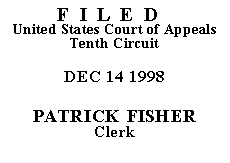

| UNITED STATES OF AMERICA,
Plaintiff-Appellee, Defendant-Appellant. |
No. 98-6259
(D.C. No. CIV-98-557-A) |
On August 7, 1996, Carlos Kevin Morales pled guilty to one count of violating 21 U.S.C. § 841(a)(1), possession with intent to distribute cocaine base (crack). The court sentenced him four months later. Mr. Morales did not appeal the judgment and sentence. On April 21, 1998, he filed a motion to vacate, set aside, or correct his sentence pursuant to 28 U.S.C. § 2255. The district court dismissed his motion as time-barred under the limitations period of the Anti-Terrorism and Effective Death Penalty Act of 1996 (AEDPA) because more than one year had passed since he was convicted. See id. The district court denied Mr. Morales' motion for leave to appeal in forma pauperis, finding that it was not taken in good faith, 28 U.S.C. § 1915(a)(3). It also refused to grant Mr. Morales a certificate of appealability under 28 U.S.C. § 2253(c).
Mr. Morales claims that applying AEDPA to bar his claim violates the Ex Post Facto Clause because he committed the underlying offenses prior to AEDPA's enactment. We are not persuaded, for several reasons. First, the Ex Post Facto Clause applies when a law retrospectively alters the definition of criminal conduct or increases the punishment for the crime. See Lynce v. Mathis, 117 S.Ct. 891, 896 (1997). Applying section 2255 to Mr. Morales claim does neither. Second, AEDPA went into effect on April 24, 1996; Mr. Morales was convicted several months later. He was therefore covered by, and on notice of, section 2255's one-year time limit on habeas corpus motions as soon as his conviction became final. Finally, we note that even applying the one-year tolling provision set out in United States v. Simmonds, 111 F.3d 737, 745-46 (10th Cir. 1997), Mr. Morales' section 2255 appeal is still untimely as it was filed after April 23, 1997. The cases Mr. Morales cites in his appeal, Weaver v. Graham, 450 U.S. 24 (1981), and Devine v. New Mexico Dept. of Corrections, 866 F.2d 339 (10th Cir. 1989), both concern the retroactive enhancement of a prisoner's punishment, and are therefore inapposite.
Mr. Morales' appeal is frivolous. We accordingly DENY him leave to file in forma pauperis, DENY his application for a certificate of appealability, and DISMISS this appeal.(1)
ENTERED FOR THE COURT
Stephanie K. Seymour
Chief Judge
*.This order and judgment is not binding precedent, except under the doctrines of law of the case, res judicata, or collateral estoppel. The court generally disfavors the citation of orders and judgments; nevertheless, an order and judgment may be cited under the terms and conditions of 10th Cir. R. 36.3.
1. 28 U.S.C. § 1915 (g) does not apply to claims raised under 28 U.S.C. § 2255, see United States v. Simmonds, 111 F.3d 737, 744 (10th Cir. 1997), and consequently this dismissal does not count as a strike under that provision.